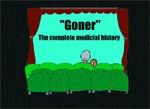Do-it-yourselfer redefines medicine
As my receptionist handed me the cat's medical record, I was immediately impressed with the size of it. Clearly, it was one of the thickest files ever compiled at my clinic.
As my receptionist handed me the cat's medical record, I was immediately impressed with the size of it. Clearly, it was one of the thickest files ever compiled at my clinic.

Along with it came the bad news. Mrs. Dingaling was on hold waiting to talk to me.
"Doctor, do you have Goner's medical record with you?" she asked. "He hasn't been himself lately, and I thought you could read his record and tell me what's wrong with him."
Hefting the inch-thick record, I was tempted to ask if I just couldn't wait for the movie to come out. Instead, I took a moment to skim over the two-pound document. It chronicled eight years of Goner's life, including just three visits to my office and 83 telephone calls.
"This," I thought to myself, "is not the type of client who pays our overhead."
Nonetheless, I politely inquired as to the problem.
"Goner is really sick this time," she told me. "He's lost a lot of weight and he won't eat a thing. Sometimes he seems so weak that he can hardly walk. What do you think it is? I don't have time to bring him over to your office. Can you tell me something that I can do at home?
That was April 1. After I explained the potential seriousness of the situation, she rushed right over, arriving on April 30. I'm not sure why she bothered to come at all. The cat was in terrible condition, but she wouldn't let me do anything.
"Isn't it true that he might die?" she asked. "It doesn't make any sense to spend money on tests or treatments if he might die anyway. I'm going to take him home and let nature take its course."
The next day, she was on the phone with a request.
"I figured out the problem," she announced. "It's in his ears. Can I come over and get some ear drops to treat him with?"
Not seeing what harm it could do, I foolishly complied. However, this only led to another call the following day.
"Those ear drops you sold me aren't any good. I think they make him dizzy. Anyway, if the infection is deep in the ears, wouldn't it make more sense to give antibiotics by mouth? I'd like to come over and get some."
Foolishly, I complied again. (I'm detecting a pattern here.)
One day later she had a new diagnosis.
"I have the problem figured out," she said. "It's in his throat. I think those antibiotics you gave me caused a fungal infection that makes it hard for him to eat. I'm going to try force-feeding him."
Surprisingly, there was no improvement the next day.
"I can't believe this is happening," she said. "Isn't there anything you can do? I find it hard to believe that in this day and age, nothing can be done to help this poor animal."
Once again, though, she refused to consider any of my suggestions for diagnosing or treatment. Two days later, however, she surprised me by actually showing up at the office. Unfortunately, she left Goner at home. She came to discuss his force-feeding schedule. She had pages of charts and graphs. They showed the feeding schedule as well as documentation of everything the cat did each moment of the day. It was an impressive array of paperwork. Never have I seen anyone go to so much trouble to do a half-assed job. (Excluding politicians, of course).
The diagnosis du jour went like this:
"I think he's constipated, Doctor. Can we try laxatives mixed in with his food?"
Against my better judgment, I let her try it.
The next day, when the much-anticipated recovery failed to materialize, she had a new question.
"Goner looks like he won't make it much longer. Do you know of any research institutions that might want to do an autopsy for free? Since we couldn't figure out what was happening to him, they might be interested in him as a scientific study."
I told her that I didn't know of any source of free autopsies and explained the costs involved with doing a complete post-mortem exam. She almost swallowed her telephone.
A week later, the inevitable happened. Goner passed away. His owner had one final request.
"Can you tell me, over the phone, how to do a simple autopsy at home?
For once, I said "no."